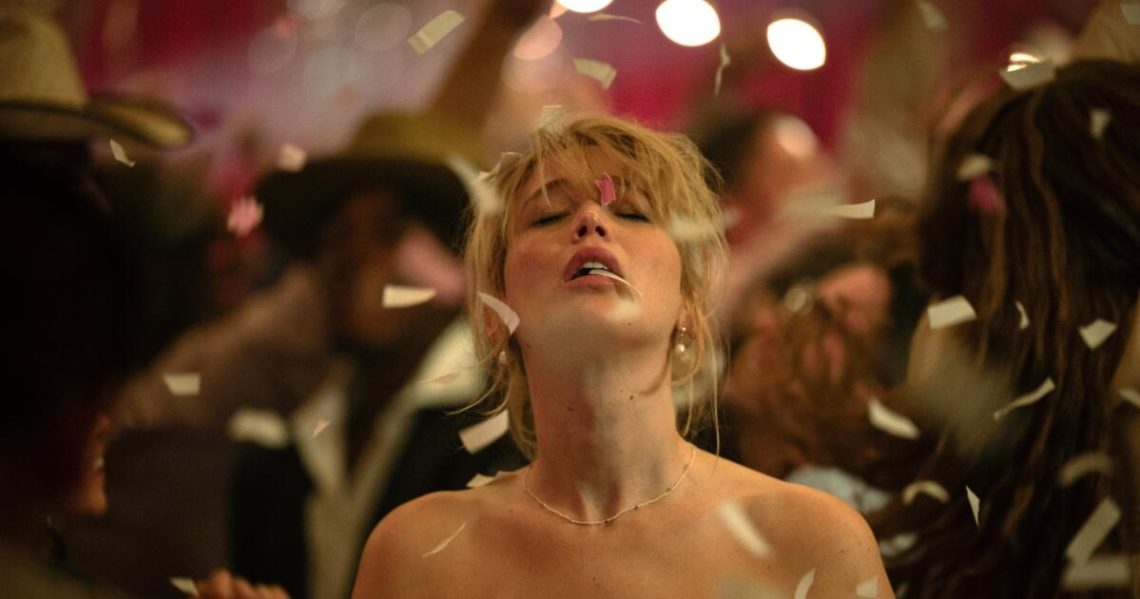The first shot of director Lynne Ramsay’s stubborn and exasperating postpartum nightmare “Die My Love” would be a great opener for a horror movie. The camera lurks in the kitchen of an isolated ranch house, as still and foreboding as a ghost, while a couple named Grace and Jackson (Jennifer Lawrence and Robert Pattinson) poke around the front porch of their newly inherited property. The two take several beats to go inside, long enough that we suspect these crazy kids are making a dangerous mistake. Just look at the wallpaper. Those florals would make anyone crack.
“It’s not New York but it’s ours,” Jackson says of the rural home, left to him by his uncle who died violently upstairs in a way that Grace finds hilarious. He grew up in the area and his parents, Pam and Harry (Sissy Spacek and Nick Nolte), still live nearby. Neither Jackson nor Grace say anything about their past lives back in the city, but he yearns to play drums and she once claimed to write. There’s a sense that their dreams have stalled out, either due to finances, passion or talent. So they move in, have a baby and pivot to domestic chaos.
Lawrence and Pattinson are such a natural, overdue pairing that it’s a surprise to realize this is the first time they’ve teamed up to make the kind of polarizing, go-for-broke prestige film they both enjoy. The two stars launched into the public consciousness roughly around the same time, then followed the same trajectory from teen franchise idols to creatively ambitious A-listers and now, more recently, newish parents making a movie about miserable parents whose hopes have run aground. Lawrence has two tots under 3; Pattinson, a toddler. Their kids shouldn’t watch this movie until college.
In a dynamic montage, Ramsay sets up their boyfriend-girlfriend pair as lusty but strange. Jackson and Grace flirt by fighting like wild beasts. Nuzzling, sniffing, biting, wrestling — that’s foreplay (and she’s more into it than he is). But they can’t communicate with words. “If you’re not feeling good, maybe we should, like … talk?” Jackson says tentatively to his increasingly restless and unstable partner. Grace isn’t interested in talking, though occasionally she’s game to scream. When they fight for real, their bodies twist into spasms of outrage. And when the other one isn’t looking, each seems to power down — Lawrence’s Grace physically collapsing like an unplugged air dancer — a clue of how much energy they must privately expend to make it work.
“Die My Love,” adapted by Ramsay, Enda Walsh and Alice Birch from the 2012 novel by Argentine author Ariana Harwicz, makes parenthood feel like being handcuffed to an anchor that’s sinking into a swamp. Lawrence’s Grace needs help and the more she flails, the worse she makes things. The book is an inner monologue of poison: “How could a weak, perverse woman like me, someone who dreams of a knife in her hand, be the mother and wife of those two individuals?” the first paragraph seethes. But Ramsay rejects putting its angst into words. As with Joaquin Phoenix in “You Were Never Really Here,” she prefers characters who silently roil under their skin.
The tension in this home starts quiet — too quiet — with Grace cranking up kiddie albums by Alvin and the Chipmunks and Raffi to drown out whatever noise is happening in her head. After Jackson brings home a stray dog, the racket becomes unbearable, with sound designers Tim Burns and Paul Davies skillfully and cruelly making sure that no matter how far Grace roams, she can still hear the darned thing bark.
Lacking much perspective into Grace, we mostly see a mentally unwell woman incensed that her sexual playtime is over. She howls with the urge to mate, prowling the house in matching fancy bras and thong sets that clash with this disheveled house and its stockpile of cheap beer. Occasionally, a mysterious leather-clad biker (LaKeith Stanfield) speeds by, considering a quickie with this bored beauty.
Grace’s erotic agony is reductive and a bit ridiculous, although I think the script is also trying to imply that Grace herself is focused on the wrong problems. The film represents her depression by coating the night scenes in so much blue tint that even Picasso might suggest dialing it back. Despite cinematographer Seamus McGarvey’s efforts to put us in her headspace with lenses that make the world blur and swirl around her, you’re more afraid of Grace than for Grace, especially when the shock editing has her smashing through doors like Michael Myers.
Hurling herself into every scene, Lawrence puts her full faith in Ramsay. It’s not a trust fall so much as a trust cannonball. As good and committed as Lawrence is, there were times I wanted to rescue her from her own movie, to protect her from the fate of Faye Dunaway when “Mommie Dearest” turned another blond Oscar winner into a joke.
Yet, this is a character who hates pity and I can’t help but admire that Ramsay faces down today’s phonily upbeat and relatable motherhood discourse with this boogey-mom who keeps herself aloof. Grace treats the older women in her family like a wall of advice to be tuned out even when they’re right. “Everybody goes a little loopy the first year,” Spacek’s Pam says, offering empathy that falls on deaf ears. (Spacek delivers a lovely, endearingly layered turn.) And while Grace is so lonely she literally claws the walls, she rejects any overture of friendship, either from a perky fellow parent (Sarah Lind) or a peppy cashier (Saylor McPherson) whose attempts to start a conversation go so badly that when the poor dear asks Grace if she’s found everything she’s looking for, Grace huffs, “In life?”
Pattinson has the more recessive role but his performance is so subtle and clever that it’s worth watching closely. His Jackson is pathetic, passive and skittish around his baby’s mother, who he both longs to heal and tries to avoid. He has a few moments that play so close to comedy — say, whining to be let into the bathroom — that you wish the movie would do more to encourage our pained, guttural laughs. The punchlines are there, such as a beat after one meltdown where Jackson admits he’s getting really stressed out and Grace coolly replies, “About what?”
There’s one scene in which Grace reveals a snippet of backstory that might explain her psychology, and I think that specificity is a narrative misstep. What’s powerful about Grace is that she’s howling for all parents, even the mostly happy ones. Harwicz’s book deliberately never gave her character a name.
Even inside this movie, Grace’s anguish is universal. Yes, she wanders into the wilderness at night, but so do her in-laws Harry and Pam, for reasons of their own.There are dark vibrations emanating from almost every character, even the minor ones, although Grace is too caught up in herself to take any comfort from that. But Ramsay is comfortable suggesting that everyone feels crazy and miserable. I suspect she thinks it’s the most normal way to live.
The post Jennifer Lawrence gives everything to the wild, brutal ‘Die My Love’ but gets left dangling appeared first on Los Angeles Times.




